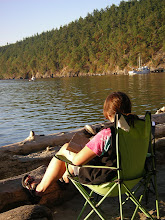As a poet, I've wrestled with the theme of spirituality in my work. I've either had poems whose speakers or characters "cried out" to God (usually dripping with despair and sentimentality...not my best work, esp. in high school). Or the speaker is searching for meaning in her life. Or the notions of church and religion have been presented through imagery and symbolism. The themes of grace, mercy, sacrifice, redemption...all these provide powerful emotional undertows for poems when used in subtle, individual ways.
I "grew up" Catholic, and one of the things I appreciate most about this experience is the rich vocabulary of symbols, images, and sacraments that it has provided me. The language connected with the Catholic experience is something I've only recently started to own in my poems, as Richard Hugo might say. This fall quarter was the first time that I actually have been able to produce a successful poem that touched on these elements of experience, the joy and pain inherent in religion and living a life that is faith-based.
From my childhood and teenage experiences, my prespective is that the Catholic Church (that is, its doctrine, practices, etc.) is fascinated by the mysterious or mystical, the darkness of sin, the blood and gore of Jesus Christ's Crucifixion.
I once read in a priest-authored book that sought to explain the Church's practices and one of the ideas that was most interesting to me (and one that I never really grasped or listened to during all my CCD, "Breakfast with God", and other sacramental, religious education classes) is the idea that the Church (with a big "C") believes that the sacramental elements of the Holy Eucharist (communion) were not just symbols of Jesus's body and blood, but that they actually became His Body and Blood when the Priest said a special prayer. I now know that this literal interpretation isn't exactly practiced anymore, though I'm sure some Catholic believers may still believe this.
Regardless, I find this fascinating ... the idea that one believes that he or she can literally swallow God, ingest Him--nourishment for the body and soul with one small, round wafer and a swallow of red wine. It is a beautiful metaphor.
One of my favorite poets, Franz Wright, is Catholic, and his faith and conversion experience is central to many of his poems. His book The Beforelife explores his personal redemption in the form of beautiful, lyrical poetry. One of my favorites is comprised of only six lines (pg. 24, The Beforelife):
Based on a Prayer of Rabi'a Al-Adawiyya
God, if I speak my love to you in fear of hell, incinerate me
in it;
if I speak my love to you in hope of heaven, close it in my face.
But if I speak to you simply because you exist, cease
withholding from me your
neverending beauty.
(note: lines 2, 5, 6 are actually indented mid-line, something this blog does not allow me to format correctly.)
Wright's latest book of poems is Walking to Martha's Vineyard, for which he won the 2004 Pulitzer Prize. He has inspired me to explore the issue of spirituality and faith in my own poems. The trick is figuring out how to do write this effectively and successfully...that is, to include the ideas of faith and a real God using authentic speakers and situations without proselytizing or creating melodramatic, sentimental verse.
I have not firmly established my aesthetic guidelines for this yet, but I am seeking.
* * *
One helpful tool for all of this is attending a new church--one that is new for me (I've been twice now) and new to Spokane (less than a year old). Vintage Faith Community is a recent church plant. It's small, down-to-earth, and real. It is what I have been looking for these past 17 months. Tonight I met the young pastor Steve personally; he greeted me in the foyer before the service. There was acoustic guitar worship, a five-minute coffee/socializing break, teaching on Philippians, Communion, a man wearing a kilt, a dog in the back row, couches at the back wall, and three MFA friends sitting near me.
* * *
P.S. A note on Fiction & Non-Fiction . . .
Some other authors who write from a Christian perspective and whom I admire (both for their skills and because they publish with mainstream presses rather than Christian publishing houses), are: Anne Lamott (numerous fiction and non-fiction books), Leif Enger (novel, Peace Like a River), and Kathleen Norris (non-fiction books and poetry). I've met each of these writers--Lamott and Enger in 2002 at Seattle readings sponsored by Elliot Bay Book Co., and Norris last year during her visit to Whitworth College.
For further reading ...

No comments:
Post a Comment